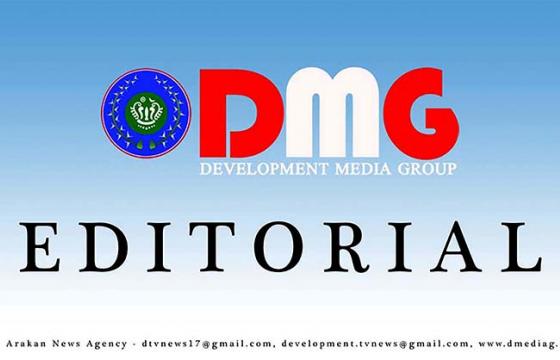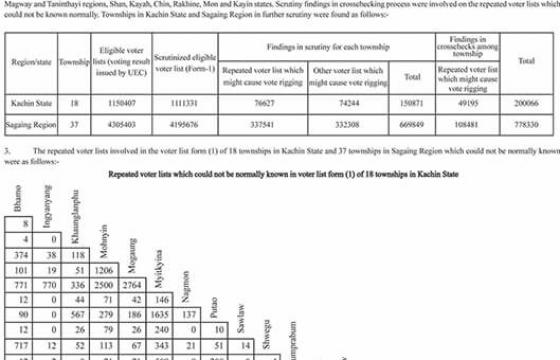As renewed heavy fighting erupted since almost one month ago, between the Kokang or Myanmar National Democratic Alliance Army (MNDAA) and the Burma Army or Tatmadaw in the Kokang Self-Administered Zone, in addition to the on and off skirmishes with members of the Northern Alliance-Burma (NAB), the Chinese Ambassador to Burma, Hong Liang urged all the other non-signatory Ethnic Armed Organizations (EAOs) to sign the Nationwide Ceasefire Agreement (NCA), so that the war along the Burma-China border could be stopped and normalcy returned.
NAB is an ethnic military alliance made up of Arakan Army (AA), Kachin Independence Army (KIA), MNDAA and Ta’ang National Liberation Army (TNLA), which has unleashed a counter-offensive on November 20 last year, in Muse Township, northern Shan State, that took the Tatmadaw by surprise. While the alliance has now withdrawn its offensive, saying that it was just a “limited strike” to show its military capability and send the Tatmadaw a strong message that they are a force to be reckoned with, the fallout from the conflict lingers on with sporadic skirmishes taking place until today.
China wants ethnic armed groups in northern Burma to sign the Nationwide Ceasefire Agreement (NCA) in order to ease fighting near the Sino-Burma border, China’s ambassador to Burma said in an interview with the state-run New Light of Myanmar on February 12.
“By signing the NCA, battles can be avoided and there can be guarantees for peace and stability along the China-Myanmar border,” Ambassador Hong Liang recently told the state-run New Light of Myanmar, adding that in order to stop the conflict, “respective parties need to be well convinced of each other.”
Against this backdrop, stakeholders are busy maneuvering or fine tuning their political footwork so that the unfolding scenario would work to their benefit, each in its own way.
Lately, important development that should be taken into account are the Kachin-Karen Laiza Joint Statement, Wa’s non-signatory ethnic leadership gathering, State Counselor-United Nationalities Federal Council (UNFC) scheduled meeting, and the Chinese involvement in the peace process.
KIO-KNU Joint Statement
Another extraordinary occurrence that happened was that the Kachin Independence Organization (KIO) and Karen National Union (KNU) meeting in Laiza, the Kachin headquarters, and the release of a joint statement, pinpointing some paragraphs from the “Deeds of Commitment” signed during the tenure of ex-President Thein Sein, that armed engagement wouldn’t be used to settle political disagreement.
The Kachin and Karen seven point joint statement of February 16 pointed out the need to adhere to the peaceful negotiation, all-inclusiveness and rejection of the Tatmadaw calling the KIO and NAB as below:
- Article No. 3 of the Deed of Commitment signed on 12 February 2015, by the KNU, Restoration Council of Shan State (RCSS), Democratic Karen Benevolent Army (DKBA), Karen National Union/Karen National Liberation Army Peace – Council (KNU/KNLA-PC) and the Government of Myanmar, the Tatmadaw (Defense Services), the Union Parliament, 19 State/Regional Ethnic Affairs Ministers and 55 political parties, committed to not use force to resolve political problems but resolve political problems through political means.
- Article 5 of the Deed further committed the signatories to not engage in armed conflict or engage in matters that can disrupt the peace process during the period peace negotiations are taking place.
- Chapter 1 (g) of the Nationwide Ceasefire Agreement (signed on 15 October 2015) is committed “To convene political dialogues with all relevant participants based on ethnic peoples’ desires and wishes towards long lasting peace.”
- (We) further urge that until peace is achieved, all ethnic armed organizations engaged in the peace process, not be considered terrorists but rather as partners in the search for peace.
Two advisers from Restoration Council of Shan State (RCSS) were also present at the meeting.
It was remarkable, as the KNU leader Mutu Say Poe has been at odd with KIO leadership after its signing of the NCA, together with other seven EAOs that later lead to the suspension of the KNU membership on its own initiative from the United Nationalities Federal Council (UNFC), which it has been a part, when it was formed in February 16, 2011.
Before that speculation were rife that the KNU delegation lobbied Chinese authorities to pressure the KIO into signing the nationwide ceasefire agreement (NCA), according to a source close to the KNU. But the KIO-KNU seven point joint statement dispelled such speculation, as the KNU was in fact agreeing to the UNFC nine point proposal saying that it would make the existing NCA stronger.
According to Myanmar Times, the KNU official Padoh Saw Ta Doh Moo said, “Though we have signed the NCA earlier, it would be good to have the nine point proposal by UNFC because it would strengthen the ceasefire than now it is.”
Prior to the meeting and making the joint statement public with the KIO, the KNU leader was said to have met the Chinese authorities at their invitation in Kunming.
China’s role
The active Chinese role in Burma’s peace process is indisputable, since the Kokang conflict erupted in February 2015, when Pheung Kya-shin’s MNDAA troops tried to wrestle back the power of Kokang Self-Administrative Zone from the Burma Army’s installed administration. The conflict produced thousands of refugees fleeing to China and also caused deaths and wounded to some Chinese citizens by stray bullets and artillery from the Burma Army. The Chinese reacted strongly to the point that it even pulled out a massive military, live ammunition, exercise for a few days at the border to shock and awe the perpetrators.
But since then, China has quietly corrected and calibrated its policy of non-interference, its shock and awe approach in the case of Kokang conflict, to an approach of “creative involvement”.
Recently, Chinese authorities have invited the KNU leader Mutu Say Poe to Kunming, where the parties should have discussed matters relating the upcoming peace conference. The meeting that followed between the KIO and KNU also touched on the same theme, as the joint statement that came out shortly after indicated.
Apart from that, reportedly, China’s special envoy for Burma would also meet the UNFC on February 25, in Chiang Mai Thailand, following the UWSA initiated EAOs leadership meeting, after which a scheduled meeting between the State Counselor and the UNFC would take place sometime within early March.
UWSA meeting
Meanwhile, the United Wa State Army (UWSA) planned EAOs leadership meeting just started on February 21 and is said to go on until 23, where the UNFC and as well the NAB are invited for the gathering. The meeting is believed to map out on how to deal with the upcoming second 21st Century Panglong Conference.
In May and November 2015, the UWSA organized two summits among ethnic leaders in Panghsang to strengthen coordination and team building. Again in March 2016, UWSA hosted another coordination meeting between the Ta’ang National Liberation Army (TNLA) and Shan State Army – South (SSA-S) over their territorial dispute.
According to Ms Yun Sun, a well known analysis on Burma-China relation, China backs UWSA efforts to enhance its leadership role among ethnic groups, hoping that the group could emerge as a centripetal force to rein in and manage various ethnic minorities.
Aung San Suu Kyi and UNFC meet
After weeks of negotiation, State Counselor Aung San Suu Kyi sent official invitation to meet the UNFC at its request, according to Zaw Htay spokesperson for the presidential office in March.
Tun Zaw, UNFC joint secretary confirmed that the meeting is fixed for March 1 and already confirmed by the government side, according to the report of RFA in its February 20 report.
The 21st Century Panglong Conference (21CPC) was said to be rescheduled although the exact date could still cannot be determined, as the KNU would be holding its Congress to elect its new leadership every four years, apart from the national-level political dialogue to be held in Chin State still under preparation and Arakan State also pressing to be allowed to do the same.
According Frontier Myanmar recent February 20 report, Zaw Htay said the union conference or 21CPC would be delayed until the end of March, meaning it would be sometime in April.
Regarding the UNFC, it is only interested to discuss policy matters and push through its 9 point proposal to be incorporated into the NCA so that it could sign it and participate in the 21CPC. It has made itself clear that it is not interested to attend the conference either as observer or any status that would be lower than the fully-fledged participants.
Outlook and perspective
There is no doubt that politicking or political maneuvering footwork are intensely going on among the stakeholders as 21CPC is geared to restart soon.
- But let us ponder a bit more to see what different stakeholders would likely be having in their mind.
- The State Counselor would like to push through her rigid time-frame agendas and driving hard to be able to include all non-signatory EAOs;
- China is also flexing its muscles to indicate that it is now ready to upgrade its sympathetic, supporting bystander stance to become a co-player, if not as an authority for a new set of game;
- The Tatmadaw is enduring bad press and tarnishing more than ever its own image by committing gross human rights violations in Arakan State and armed conflict ridden Kachin and Shan States, and at the same time, not knowing how to go about on whether to accommodate democratization further or put a stop to it, so that it could continue to maintain its political edge;
- The UNFC is trying to push through its nine point proposed agenda, in order to be able to achieve a level playing field so that it may not be handicapped in peace negotiation process;
- The UWSA, together with the National Democratic Alliance Army (NDAA), are worried that if the UNFC could make a deal and enter the 21CPC, they will be left out and won’t be able to further their aspirations of upgrading their administrative statuses; and
- The NAB primary is worried that its members would be left out from the peace dialogue process and would continue to be targeted by further military onslaught.
While it might seem that accommodating such a variety of wish list and aspirations could be really daunting and a mammoth task, all the stakeholders or parties do have one thing in common, which is the absence of war and achievement of peace that would foster reconciliation and political settlement, followed by much needed development in all socioeconomic sectors.
To be able to do this, as time and again been advocated, all parties concerned must first have an unwavering “political will” buttressing it with “trust-building”, a term frequently used by all contenders but rarely put into practice.
As such, the best place to start the realization of political will, which is the achievement of “peace”, would need to create an atmosphere of “trust”. In turn, in order to be trustworthy an act of “trust stimulation” is needed. And this is none other than to stop the war of offensive initiated by the Tatmadaw first and foremost.
If this could be pulled through by the Tatmadaw in good faith, all the rest would eventually fall into line. In other words, the earnest peace process negotiation within the mold of 21CPC could follow, which until today is still in a limbo. Otherwise, we all will continue to be bogged down in the vicious circle of violence and disagreement unable to resolve our differences as civilized human beings should be doing.






